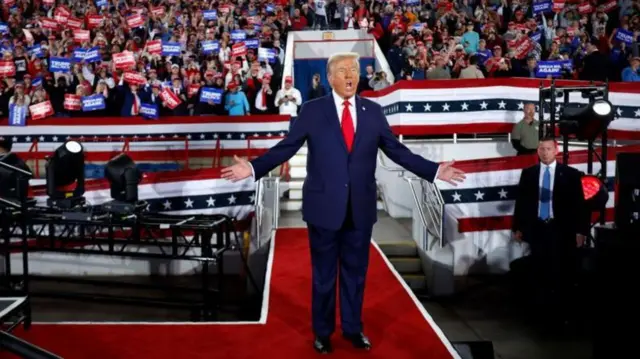Reports
Will Trump Establish a Cohesive Policy to End the War in Sudan?

As the violent conflict between Sudan’s Armed Forces and the Rapid Support Forces continues—displacing millions and pushing Sudan towards collapse—questions arise about how Trump might respond to this crisis. With Sudan’s future uncertain, will Trump and the Republican Party develop a coherent strategy to curb the violence, or will the war continue without a clear U.S. policy?
American Interests: In Trump’s first term, his foreign policy was marked by unpredictability, a focus on “America First,” and a reluctance to intervene in conflicts that did not directly threaten U.S. interests. His administration largely avoided foreign interventions, preferring economic actions, diplomatic efforts, and reduced military commitments. What could a second Trump term mean for Sudan, and how might Republican views on international intervention influence the U.S. response?
Trump’s foreign policy was defined by a strong reluctance for U.S. military intervention unless there was a clear, tangible benefit. His priorities were U.S. economic and security interests, often at the expense of multilateral diplomacy or international humanitarian efforts. Trump was highly skeptical of intervention in regions like the Middle East, Africa, or Central Asia, where American security interests were limited.
During his first term, Trump withdrew troops from Syria and Afghanistan, arguing that the U.S. had spent too many years in “endless wars” with limited returns. His administration distanced itself from multilateral institutions like NATO and took a strict stance on foreign aid, especially toward countries that were not seen as adequately defending themselves.
In Sudan, Trump’s administration took practical measures—such as imposing targeted sanctions on key Sudanese figures and facilitating Sudan’s normalization with Israel as part of the Abraham Accords—while showing little interest in deep involvement in the internal conflict. Based on this history, it is unlikely that Trump would change his approach significantly, especially as Sudan’s conflict does not pose a direct threat to U.S. national security.
There is no unified Republican stance on Sudan; however, many in the party share Trump’s reluctance for military intervention in regions like Africa. Republicans generally prioritize countering threats from China, Russia, and Iran, and are likely to resist military involvement in conflicts that do not directly impact U.S. security.
For most Republicans, military intervention or “nation-building” in Sudan is unlikely to gain broad support. However, some of the more interventionist factions within the party might advocate for stronger actions if they are tied to U.S. interests, such as counterterrorism measures in the event that Sudan becomes a haven for extremist groups like al-Qaeda or ISIS.
Diplomatic Pressure: Even these more interventionist voices would likely oppose large-scale operations in Sudan. Instead, the Republican Party would likely focus on targeted sanctions, diplomatic pressure, and support for international peace talks. Given Sudan’s complex internal dynamics and the lack of a direct strategic interest for the U.S., Sudan will likely remain a “complex problem” for Republicans, unlikely to take priority over other issues like immigration, trade, or domestic concerns.
Trump’s response is likely to center on diplomatic and economic solutions rather than military action, prioritizing American security interests and reducing U.S. involvement in conflicts that do not directly affect the country.
The diplomatic solution, in line with the “America First” policy, would be the preferred option, leveraging external powers to influence the situation. Trump may turn to regional players like Egypt, Saudi Arabia, and the UAE to take a larger role in negotiations, using their influence to achieve a ceasefire.
Economic Sanctions: Economic sanctions are likely to remain a key tool for pressuring Sudanese leaders to enter peace talks. Additionally, Trump may use economic leverage, such as restricting military aid or blocking Sudan’s access to international financial institutions, without committing the U.S. to a reconstruction process.
Republican lawmakers in Congress would likely support the administration’s cautious approach. While there would be bipartisan support for humanitarian aid and diplomatic efforts, there would be strong opposition to large-scale military intervention or peacekeeping missions.
Some Republicans may push for tougher sanctions or stronger diplomatic measures to pressure the warring parties, but military intervention would remain off the table. If the Sudanese conflict escalates to a level that directly threatens U.S. interests—such as the emergence of extremist groups or instability in neighboring countries—Republicans might back stronger actions. However, without a direct security threat, there would be little appetite for significant U.S. involvement.
Leveraging Influence: Trump’s policy toward Sudan would likely be based on limited engagement. He would focus on economic and diplomatic measures, using American influence to encourage peace talks and a political solution without draining resources.
Sudan’s fate would likely depend on regional actors and international bodies, while the U.S. focuses on safeguarding its own interests. Trump and the Republican Party are expected to take steps to address the Sudanese war through economic and diplomatic tools, with limited American intervention.



